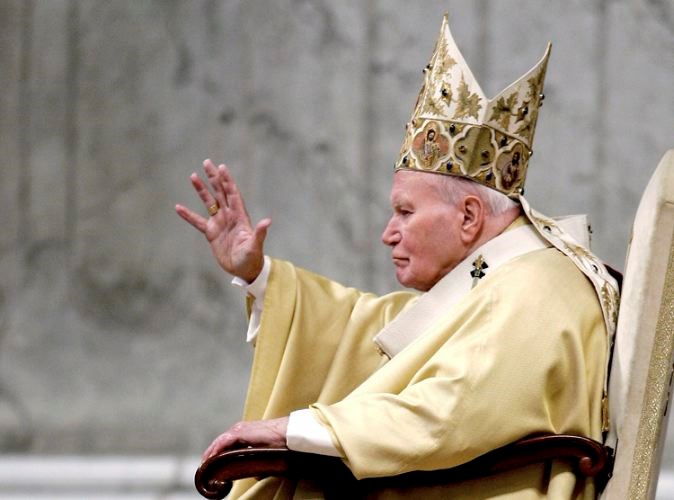As my impromptu Lenten series draws to a close and we come to the doorstep of the three holy days marking the Last Supper, Passion, Death, and Resurrection of Christ, there remains the question of ecumenincal action "in the world." Put simply, it's all well and good to call Christians to prayer, confession, even poverty relief; but what concrete steps can believers take to counter the spread of thoughts, words, and deeds that seek to undermine our humanity?
For an answer, I offer a name: Saint Pope John Paul the Second. The briefest biography of him online can be found in two memes: the first has the punchline, "who would win in a fight - all of Communism or some Polish guy?" and the second has pictures of Obama and Trump's crowds at inauguration compared to the million plus youths that gathered for this Pope several times. The secret to Pope John Paul's success in both was unwavering faith in the power of Jesus Christ.
"Jesus Christ is the answer to the question that is every human heart," said Pope John Paul, and he lived by those words everyday.
This in turn lead him to the conviction that religious freedom was the first of all human rights - the seed from which liberty sprouted and bloomed into a free society. Having experienced the lies and violence of totalitarianism in Poland under both Hitler and Stalin, Pope John Paul made it his personal mission to speak Christianity's truth to worldly power.
Pope John Paul did not compromise his stance regardless of his audience or the powers over them. While still in Poland, Pope John Paul preached against the Communists' attempts to break up communities and families with methods that included everything from architecture to abortion. When he was elected to the papacy, Pope John Paul continued to remember his Polish roots, backing Solidarity which ultimately became the wedge that broke the Warsaw Pact and Soviet Empire.
But the Polish Pope did not spare his more democratic neighbours from the truth where it applied. Pope John Paul was not loved for pointing out how liberty had transformed into libertinism, that the sexual revolution had relegated women to second class status and deeply harmed the family, that the wealth of the West should not come at the expense of the poor. The dignity of all people was obvious to Pope John Paul because of his conviction they were all God's children.
Pope John Paul made enormous strides in ecumenism as well, both for the reunification of the faith itself, but also for co-operation in education, the rights of the unborn, the developing world, and believers suffering under oppressive regimes around the globe.
In faith and works, words and deeds, Pope John Paul proved that "feed my sheep" was a perpetual command from Christ to Peter and his successors regarding all Christian believers of all denominations. For the full story of this incredible man, whom some have even called "Saint John Paul the Great," you can read George Weigel's 1000 page Witness to Hope, the official biography.
Returning to the practical question of believers' actions "in the world," I offered up the name of Saint Pope John Paul the Second precisely because he faced so many of the same issues we have today: devaluing the unborn, the infirm, and the elderly to legitimize abortion and euthanasia; undermining the traditional family in public policy and culture; forcing believing citizens to compromise their faith for the state; and the many genocides of religious minorities.
This is certainly a bleak state of affairs. But in Pope John Paul we have a model for engagement with the world: he began by stating that truth really does exist, that it leads us to God, and that the resulting faith's first action must be to recognize the inherent dignity of every human life.
At his ascension to the Throne of Peter, some Polish guy told billions of souls the secret to defeating evil in our world: "Be not afraid!"
We believers would do well to adopt his call again.



